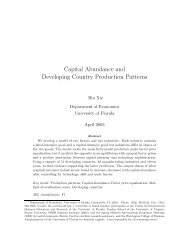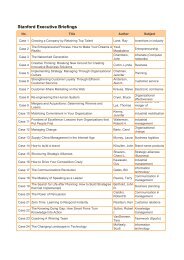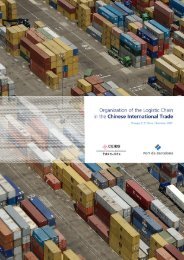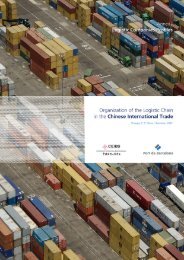游戏开始 - China Europe International Business School
游戏开始 - China Europe International Business School
游戏开始 - China Europe International Business School
You also want an ePaper? Increase the reach of your titles
YUMPU automatically turns print PDFs into web optimized ePapers that Google loves.
迈克尔 · 戴尔还是雷锋<br />
尽管创业者在中国可以收获很多好处,但是只<br />
有 1/5 的新兴公司能够顺利渡过一年。中欧教授们<br />
一致认为,在中国,创业所面临的一个最大障碍就<br />
是缺乏对创业的鼓励,无论是学术界、金融机构(不<br />
愿意提供信贷),甚至朋友、家人都反对创业。葛教<br />
授指出,在美国,中小型企业解决了 85% 的就业,<br />
95% 的新就业岗位由中小企业创造。因此,中国如<br />
果创造一个有利于创业的环境,可以获益很多。<br />
葛教授期望看到中国商业文化对风险的承受能力<br />
能够得到改变。“西方的风险资本家的确也会检查公<br />
司的成败,但是他们也看中你从失误中收获了什么。<br />
在中国,市场尚未成熟,所以,大家在判断公司的时<br />
候只看其结果——这样的环境不利于创业。我们应<br />
该在国内营造一个有利于创业的环境”, 他说。<br />
他和中欧的其他教授建议,为了营造更有利的<br />
环境,中国应该建立诸如美国小企业管理局这样的<br />
公共机构,来帮助新兴企业和中小企业。在葛教授<br />
看来,事实上,中国年轻一代的创业精神已经初见<br />
端倪。“80 后的一代和上一代不一样,他们更多元<br />
化。”他说,“过去的楷模是雷锋,现在是比尔 · 盖茨<br />
和迈克尔 · 戴尔。”他提到了诸如真功夫餐饮集团创<br />
办人及 CEO 蔡达标(EMBA2006)这样的企业家,<br />
真功夫是首家成功地大规模推广中式快餐连锁店的<br />
公司。<br />
风险与风险资本<br />
新兴企业所面临的另一个困难就是中国的银行<br />
体制。“国内银行一般不支持创业和小型企业,特别<br />
是在西部地区。”言培文教授说,更糟糕的是,当创<br />
业者无法通过正规的金融机构获取资金时,他们就<br />
会求助于地下钱庄。“中国有一个很发达的灰色市场,<br />
很多中国创业者都从那里获取资金——但是这样是<br />
有问题的。”言培文说,因为这个体系是非法的,创<br />
业者很容易受骗,这个问题在国内欠发达地区显得<br />
尤为严重。<br />
封面关注 COvEr STOry<br />
TheLINK 2007 冬季刊 TheLINK Winter 2007/8<br />
就可获得的风险资本而言,葛教授认为中国有<br />
很多的风险资本,但并不针对那些处于起步阶段的<br />
公司。“创业者在播种阶段进行初步市场调查时,还<br />
无法获得充足的资金。你必须依靠自己。而当你发<br />
展壮大,不需要钱的时候,投资者才愿意投资。”<br />
一旦公司开始运作,它面临的一个最大挑战就<br />
是保证其商业运作的道德性。蔡舒恒教授这样描述<br />
道 :“在某种程度上,你可以将现在的中国和 30 年<br />
前的台湾进行比较。创业者就像牛仔——他们很喜<br />
欢冒险,很喜欢风险”。很多情况下,因为新创建的<br />
公司规模小、抵抗力差,所以就很可能在商业伙伴、<br />
供应商和员工间滋生腐败。蔡教授对这个问题进行<br />
了研究。他专门研究了台湾地产公司信义在运营中防<br />
范腐败所采取的种种努力。蔡教授在美国费城召开<br />
的 2007 管理学会年会上阐述了该研究结果,并将<br />
于 2008 年以案例形式将其发表。<br />
言培文教授对此表示同意,他说 :“确实可以看<br />
到不少创业者的不道德行为,如侵犯知识产权或其<br />
他侵犯法律的行为”。他强调,中国商业圈中讲关系<br />
的习惯也导致了一些不符合商业道德的行为。对新兴<br />
企业来说,尤为致命的威胁是,员工或者以前的员<br />
工盗用公司的技术、合同或流程,创办一个类似的<br />
对手公司。<br />
适逢其时<br />
未来将会给中国的创业者带来什么?中欧教授认<br />
为前景非常之好,至少在近期是这样的。“未来五年<br />
对创业者来说是相当令人兴奋的”,言培文教授说,<br />
“你能够得到发展,有很多创业者可以进入的空间。”<br />
葛教授进一步说,对很多行业而言,最佳创<br />
业阶段就是现在。“十年后,竞争就会很激烈了。<br />
很多行业的格局正在形成,因此未来进入的门槛<br />
就会高得多。所以我告诉学生们 :要创业,趁现<br />
在。”<br />
COwbOys ANd COwGirls<br />
Another hardship for would-be startups is<br />
<strong>China</strong>’s banking system. “The banks in <strong>China</strong><br />
are generally not very supportive of entrepre-<br />
neurs and small businesses, particularly in<br />
western <strong>China</strong>,” says Prof. Jenster. Even worse,<br />
when cash is not available via established fi-<br />
nancial systems, business founders often turn to<br />
<strong>China</strong>’s underground money lenders. “There is<br />
a well developed gray market for lending where<br />
many Chinese go to get financing – but this can<br />
be very problematic,” says Jenster. Because the<br />
system is not legal, business founders can easily<br />
be cheated. He says the problem is particularly<br />
serious in the lesser developed regions of <strong>China</strong>.<br />
In terms of available venture capital,<br />
Prof. Ge says lots of VC money is available in<br />
<strong>China</strong>, but not for startups at the beginning<br />
phase. “Sufficient money is not available for<br />
entrepreneurs in the seed stage, for conducting<br />
initial market research. You have to do this on<br />
your own [in <strong>China</strong>]. Only when you don’t need<br />
money – when you are up and running – then<br />
investors are willing to invest.”<br />
Once a new company is operating, one of<br />
the biggest challenges is ensuring ethical busi-<br />
ness operations. CEIBS Management Professor<br />
Terence Tsai describes the scenario in this<br />
way: “In some ways, you can draw parallels<br />
between <strong>China</strong> now and Taiwan 30 years ago.<br />
Entrepreneurs are behaving like cowboys and<br />
cowgirls – they are very adventurous, very risk<br />
friendly.” In many cases, because startups tend<br />
to be small-scale and vulnerable, they make<br />
likely targets for corruption among business<br />
partners, suppliers or even employees. Tsai’s<br />
research into this issue includes a detailed case<br />
study on the Taiwan-based real estate firm Sinyi<br />
Realty Inc., chronicling the company’s efforts in<br />
Taiwan, and now mainland <strong>China</strong>, not to tolerate<br />
corrupt practices within its operations.<br />
Tsai's research on this was presented at the 2007<br />
Academy of Management annual meeting in<br />
Philadelphia, and will be published in 2008 as a<br />
CEIBS case study.<br />
“You do see quite a lot of seriously unethical<br />
behavior where entrepreneurs in <strong>China</strong> are engaged<br />
in IPR crimes or other violations,” agrees<br />
Prof. Jenster. He stresses that <strong>China</strong>’s guanxi<br />
system of business relationships also creates<br />
the potential for unethical behavior. Particularly<br />
devastating for startups is the threat of current or<br />
former employees stealing company technology,<br />
contacts, or processes and starting a similar and<br />
competing business.<br />
NOw’s The TiMe<br />
What will the future bring for entrepreneurs in<br />
<strong>China</strong>? CEIBS professors see a rosy future, at<br />
least in the short term. “The next five years will<br />
still be very exciting for entrepreneurs,” says<br />
Per Jenster. “You have the growth; you will have<br />
a lot of room for entrepreneurs to step into the<br />
market.”<br />
Going one step further, Prof. Ge says, for<br />
many sectors, the best time to launch a business<br />
in <strong>China</strong> may be right now. “Ten years from<br />
now, competitors will have come in. Many industries<br />
[in <strong>China</strong>] are now consolidating. In the<br />
future, the entry barriers will be much higher,”<br />
he says. “I tell my students: If you want to start<br />
a business, start now.”










